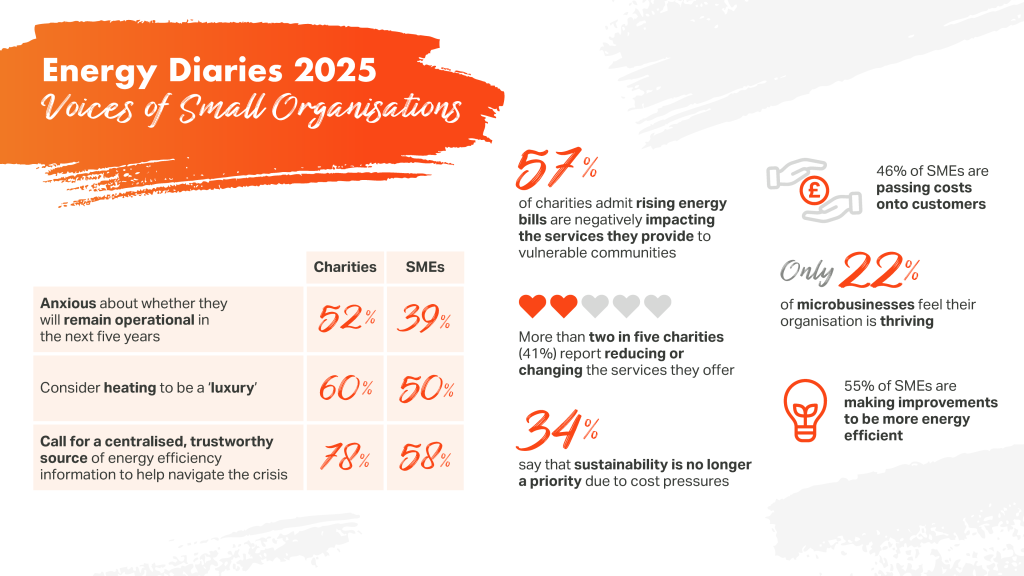Two in five small businesses fear closure amid rising energy costs

New research from Cadent, the UK’s largest gas distribution network, and Thinks Insight & Strategy has revealed that small businesses – the backbone of the UK’s economy – are being pushed to breaking point by rising energy costs.
Two in five SMEs (39%) fear they may not survive the next five years, with half of businesses viewing heating as a luxury. Half of SMEs (50%) admit that keeping their premises warm is becoming unaffordable, while more than a third (37%) say they have been left with no choice but to reluctantly pass rising costs on to customers.
The research, which is a continuation of Cadent’s annual Energy Diaries series which explores how different consumer groups feel about energy usage, exposes the stark reality organisations face, with rising bills forcing many to freeze recruitment, cut staff, or even scale sustainability investment.
As the ongoing challenges associated with the cost of living continues to impact millions across the UK, charities are similarly struggling, with many sacrificing essential services for energy cost savings. More than two in five (41%) charities report reducing or changing the services they offer.
The research also revealed that working towards a sustainable future is also taking a hit. While most small organisations believe sustainability is important – with steps taken where possible to implement sustainable behaviours – affordability is more of a priority. According to the Energy Diaries report, SMEs are engaged with sustainability but feel they need more support to fully embrace changes, while charities are simply unable to prioritise sustainability.
David Bridson, Head of Campaigns and Research, YMCA, England and Wales, said: “At YMCA, we’ve long understood the critical role that charities play in meeting the needs of our most vulnerable communities, and this research underscores the urgency of tackling rising energy costs. These findings highlight the need for meaningful action and practical solutions to help charities maintain their vital services. Collaboration between policymakers, energy providers, and community organisations is essential to navigating this crisis effectively and ensuring the sustainability of the support our communities rely on. We welcome Cadent bringing this topic forward and want to ensure people understand the importance of small business, and all business for that matter, in creating the much-needed employment opportunities.”
Paul Walmsley, co-founder of Social Brokers, a Community Interest Company, said: “The rising cost of energy is making it increasingly difficult for organisations like The Social Brokers to continue supporting our communities. Our timetable is full, and we expect to welcome 12,000 people through our doors this year, yet we are struggling to keep up with demand. Energy costs have skyrocketed! We work with several local charities who are also feeling the pinch and those are the ones who could maximise their offer if they didn’t have to pay out energy bills of over £3k per month, equivalent to the cost of hiring two essential support workers who could be providing life-changing services to those in need.
“Year-round energy challenges amplify the strain. In summer, we’re providing air conditioning to keep our spaces usable, while the need to heat our buildings in winter can feel like a trade-off for providing essential services. These costs prevent us from prioritising sustainability goals and meeting the growing needs of our community.
“We’ve been fortunate to receive funding from Cadent, which has helped ease some of these burdens. But, as the Energy Diaries findings make clear, decisive action and collaborative solutions are crucial to ensuring charities like ours, and the communities we support, can survive and thrive. Without this further support, the needs of vulnerable individuals across the UK will go unmet.”
Adele Lister, Director at Thinks Insight & Strategy commented: “This is the fourth iteration of the Energy Diaries series that we have worked on with Cadent. Hearing from SMEs and charities this year about the challenges their organisations face has been eye-opening, and it’s been great to share ideas with them on how Cadent can help with the pressures of rising energy costs. SMEs and charities believe tips on how to reduce energy costs are normally reserved for consumers rather than businesses, so they welcome the prospect of having something directly tailored to small organisations.”
Dr Angela Needle, Director of Strategy at Cadent, said: “SMEs and charities are vital pillars of our communities, and yet they are facing extraordinary challenges, with many doubting their ability to keep their doors open.
“Heating should not be considered a luxury, but our findings show that for half of SMEs and three in five charities, this is the stark reality. Rising costs are forcing difficult trade-offs, from cutting staff to scaling back vital services, and that has a knock-on effect on the people and communities who rely on them most. Our concerns are the impact on the most vulnerable in society.
“Our Energy Diaries series is part of our ongoing commitment to helping customers work towards a sustainable future. Now in its fourth year, this important set of insights shines a spotlight on the need for decisive action to address the energy burden and support these organisations in becoming more resilient.”
In response to the growing challenges, Cadent has partnered with Energy Saving Trust to equip SMEs and charities with actionable energy-saving guidance to reduce operational costs. The free downloadable advice includes a breakdown of government initiatives – both national and local – as well as simple considerations like replicating the energy-saving behaviours used at home.
Angela continued: “We believe collaboration is key. By working with charities, policymakers, and partners such as Energy Saving Trust, we can provide the practical tools, advice, and long-term solutions these organisations need. Our goal is to ensure that SMEs and charities not only survive the current crisis but are equipped to thrive and their needs are fully understood as part of the energy transition debate.”
Energy Diaries remains a cornerstone of Cadent’s commitment to understanding the immediate needs of its customers, including businesses. Through ongoing insights and partnerships, Cadent aims to empower organisations and individuals to tackle today’s challenges while building towards a greener, more secure future for all.
As part of the Energy Diaries, Cadent and Thinks Insights & Strategy surveyed 400 SMEs and 144 charities and conducted in-depth interviews with 12 SMEs and eight charities. Key findings outlined in the report include:
- Over half (52%) of charities and two in five SMEs (39%) are uncertain about whether they will remain operational in the next five years.
- Only 22 per cent of micro businesses feel their organisation is thriving.
- Half of SMEs and 60 per cent of charities are worried that heating has become a luxury for some organisations in the UK.
- Over one third (34%) of charities say that sustainability is no longer a priority due to cost pressures. Similarly, 58% of SMEs and 78% of charities call for a centralised, trustworthy source of energy efficiency information to help navigate the crisis.
For more information and to read the full 2025 Energy Diaries report, visit here.



